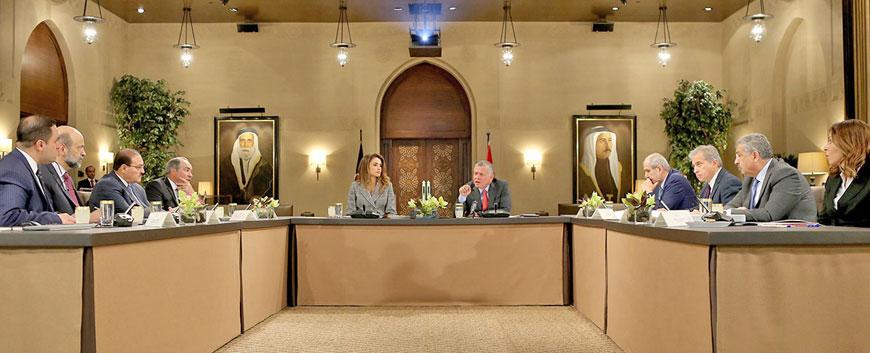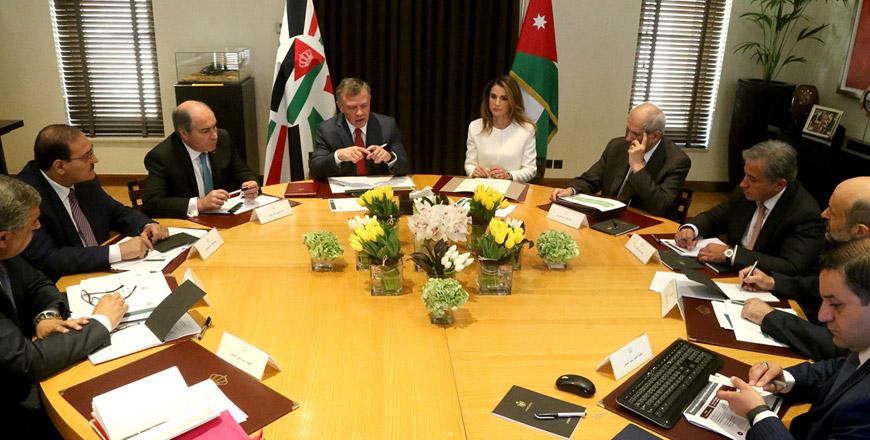You are here
King sets deadline to have ‘tangible results’ in human resources reform
By JT - Jan 17,2018 - Last updated at Jan 17,2018

Their Majesties King Abdullah and Queen Rania meet with officials concerned with executing a human resources strategy in Amman on Wednesday (Photo courtesy of Royal Court)
AMMAN — His Majesty King Abdullah on Wednesday chaired a meeting, attended by Her Majesty Queen Rania, to follow up on the implementation of the 2016-2025 National Strategy for Human Resources Development.
His Majesty checked on progress in the implementation of the strategy, which was launched in September 2016 in a bid to develop human resources capabilities and regulate the work of all sectors related to education since early childhood until joining the labour market, according to a Royal Court statement.
King Abdullah, during the meeting held at Al Husseiniya Palace, stressed that coordinating efforts to follow up on the strategy’s execution is vital, and has to continue according to the set mechanism, emphasising that any disturbance to the required progress and reform is unacceptable.
He set the beginning of the next academic year as a deadline for having in place the required reforms, adding that there will be periodic revisions to ensure that things are on the right track and stressing that such a policy will become a fixture in the work of future governments as well.
Regarding vocational and technical education, the King urged substantial steps that lead to a drastic change in the sector through guaranteeing the quality of education outcomes and enabling trainees to acquire skills that qualify them to compete for jobs available in the labour market.
Prime Minister Hani Mulki stressed that the government works to implement Royal directives to improve school, university, technological, technical and vocational education through innovative means.
Mulki reviewed the government’s plan to face challenges that undermine opportunities to develop the technical and vocational education sector, through engaging the private sector in the planning and implementation processes.
The prime minister pointed out the establishment of an independent national centre for developing curricula, adding that stakeholders are implementing a plan to “professionalise” the teachers’ job and develop necessary competencies, as well as making a broad range of legislative changes related to higher education.
Also under way is a plan to address structural flaws in the technical and vocational education, the premier said, so as to meet the requirements of the local and regional labour markets, adding that the government is considering out-of-the-box ideas to secure necessary funds to implement the strategy.
Higher Education Minister Adel Tweisi outlined the ministry’s efforts to implement the strategy, especially those related to institutionalising assessments of universities and the performance of their presidents.
He also went over the ministry’s efforts in curbing campus violence, and helping secondary school graduates to choose specialisations that meet the needs of the labour market.
As for the 2018 law of the higher council for vocational and technical training and education in the making, Labour Minister Ali Ghezawi said that the law is currently being revised by the Opinion and Legislation Bureau and aims at taking the Kingdom’s vocational education to the next level.
Education Minister Omar Razzaz reviewed the ministry’s achievements in benefiting from technology in the educational process, including a plan to develop students’ programming skills.
Razzaz also went over the progress made in school online connectivity and the ministry’s plan to develop the General Secondary Education Certificate Examination (Tawjihi).
Related Articles
UNITED NATIONS, United States — UN Secretary General Antonio Guterres hailed "tangible progress" made in recent months in tackling Libya's a
AMMAN — His Majesty King Abdullah on Sunday chaired a meeting, attended by Her Majesty Queen Rania, to follow up on the implementation of th
AMMAN — His Majesty King Abdullah on Sunday met with the president and members of the higher ministerial committee for the implementation of
















